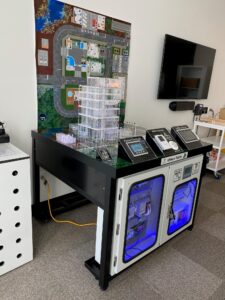
Infrastructure cybersecurity is being examined by Flinders University via new computerised model of a city segment at Tonsley.
The new facility, based on a large university building or hospital with power and essential services, will be used to research and teach critical infrastructure cyber-physical systems cybersecurity.
Associate Professor in Cybersecurity and Networking Elena Sitnikova says students are already enjoying the so-called ‘Urban Table and Train’, with a special series of workshops run last month to demonstrate Digital Forensics and Cybersecurity techniques led by Professor Ray Hunt, from the University of Canterbury in New Zealand, with input from Dr Darren Quick, Senior Digital Forensics Investigator from SAPOL.
Prospective students and the public will also be able to see the Urban Table on show at the Flinders University Open Day at Tonsley on Saturday 19 August.

“Digital Forensics is a high-demand field for skilled professionals and is anticipated to grow rapidly over the next decade,” explains workshop organiser Associate Professor Sitnikova, ahead of a new Digital Forensics stream being introduced by the College of Science and Engineering in 2024.
“It builds on fundamental cybersecurity knowledge, offering both cybersecurity and digital forensics investigator specialists a significant opportunity to become frontiers in defending our society from cyber-attacks.”
Students from diverse programs, including computer science and electrical engineering, attended the workshops, as well as some IDS and other staff.
Associate Professor Sitnikova noted about 25% female participants, with women in cybersecurity being promoted by the College with support from a WiCyS Australia affiliation.
“The new facility offers interactive, hands-on practical exercises to assess risks associated with emerging cybersecurity threats, plus the challenges facing investigators to uncover digital evidence,” she says.
“The sessions demonstrated the new lab’s ‘real-world’ examples of Critical Infrastructure Protection, application forensics on TCP/IP, Voice over IP, and video attacks, exploits and forensics analysis, Internet of Things (IN)security and forensics on smart home applications, automation and controls of critical infrastructure SCADA systems.”

